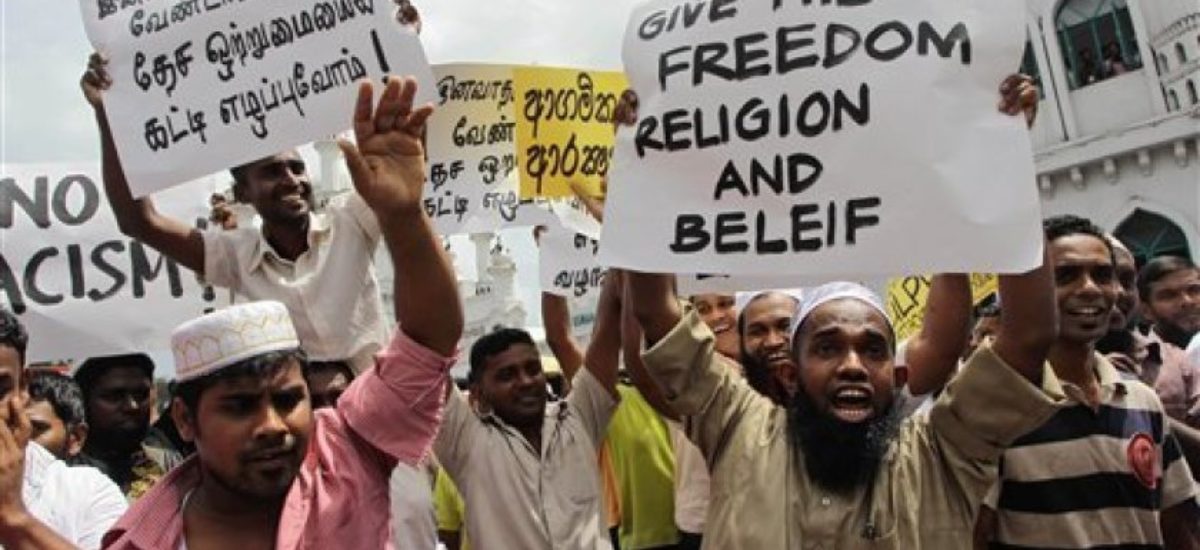Photo courtesy of San Diego Union-Tribune
Article 9 of Sri Lanka’s Constitution states: “The Republic of Sri Lanka shall give to Buddhism the foremost place and accordingly it shall be the duty of the State to protect and foster the Buddha Sasana.”
The promise to establish a government that upholds the values of the Buddhist Sinhala majority was central to President Gotabaya’s party platform in the presidential and parliamentary elections. Following his party’s win in the parliamentary election, he has begun to take steps towards keeping that promise. The fear is that the president’s commitment to prioritising Buddhism, the government’s majority in parliament and the influence of far right Buddhist nationalist groups could result in the restriction of religious freedom for ethnic minorities and the rise of ethno-religious violence.
In the past 20 years, there have been over 900 documented violent incidents against Christians, including targeted killings of Christian clergy, physical violence and extensive destruction of places of worship and property. In 2004 the Jathika Hela Urumaya, a political party consisting solely of Buddhist monks, introduced a bill in parliament calling for the Prohibition of Forcible Conversion of Religion. The intent was to prevent “unethical conversions” by evangelical Christian churches. Buddhist nationalists claimed that evangelical churches deliberately targeted vulnerable populations for conversion by force, fraud or allurement. The Supreme Court declared this bill as unconstitutional as it violated the right to freedom of thought, conscience and religion, including the freedom to have or adopt a religion or belief of one’s choice. Regardless of this ruling, in 2004 there was a significant increase in violent attacks against Christians, with the highest number of recorded incidents to date.
Sri Lanka has seen a surge of anti-Muslim rhetoric since the end of the civil war. Far-right groups like Bodu Bala Sena, the Sinhala Ravaya, Sinhale and Mahason Balaya have stoked fears of unethical conversion to Islam, global jihadism, high Muslim birth rates, and promoted resentment of the perceived success of the Muslim business community. In 2014 a rally organized by Bodu Bala Sena escalated into riots against Muslims in Aluthgama, inciting the worst communal violence since the end of the war. In March 2018, an island wide state of emergency was declared in response to almost 2 weeks of Sinhala-Muslim riots that left two people dead, 15 injured, and damage to over 45 businesses, homes, and places of worship. The Easter bombings in 2019 have heightened tensions; resulting in continued violence against Muslim business and mosques, vigilante attacks on women wearing hijab, and rumour campaigns alleging Muslim plots to sterilise Sinhalese women.
At the annual convention of the All Ceylon Buddhist Congress in March, Prime Minister Mahinda Rajapaksa implied that if he gained parliamentary support he would reintroduce anti-conversion legislation. With the Sri Lanka People’s Party as a majority in parliament, he now has the ability to do so. Meanwhile, President Gotabaya Rajapaksa has appointed prominent Buddhist monks to serve on an advisory council creating the opportunity for Buddhist religious leaders to significantly influence state policy. The president has also created a task force to protect places of archaeological importance to Buddhist heritage, which implicitly discriminates against Christian, Hindu and Muslim minorities who also lay claim to these sites. If the government continues to integrate extremist values into state policy,anti-Christian and anti-Muslim religious organisations will only be emboldened further.
We should vote political parties into government, not religions; but if the government insists on giving religion a place in politics, it should reflect the religious beliefs of all those who live in the country. President Rajapaksa is known for his decisive leadership and the ability to get things done but the right to religious freedom should not be dismissed as elitist or irrelevant in favour of what this government could do for Sri Lanka’s economy. We can have an effective government that also guarantees the equal rights of ethnic and religious minorities. We should demand this from our leaders.

